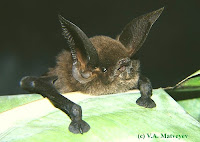
A new species of bat has been discovered, Myzopoda schliemanni, in the dry western forests of Madagascar. New research published onine in the journal Mmmalian Biology states that the new species is particularly unusual as it belongs to very rare family of bat wih only one other species, Myzopoda aurita (shown in the image above) which is also endemic to Madagscar. This new discovery, which is thought to have evolved from M.aurita, suggests that the Myzopodo family may not be as susceptible to deforestation of the moist tropical forests as the new species appears to be well adapted to the large broad-leaf Ravenala that are often pioneering plants in zones where the original forests have been cleared and burned.
Bats in Madagascar have not been extensively studied due to the popularity of the charismatic lemur species. Recent surveys found that one third of the species sighted were new to science.
Scientists have isolated a new molecule from the bark of the plant Strychnopsis thouarsii, which lives in the eastern rain forests and is native to Madagascar which may form the basis of a new malaria drug.
The molecule, tazopsine, was effective against early, liver-stage malaria parasites in animal tests, according to a report pubished in PLoS Medicine. This could form the basis for a new treatment targetting the early stages of malaria infection, making it harder for the parasite to develop resistance, a common problem in treating the mosquito-borne disease.
Malagasy people have traditionally used the bark in medicinal tea as a malarial treatment. More than 200 native plant species are thought to have some role in fighting the disease, highlighting the huge potential for medical developments from natural rainforests.
Only about eight percent of Madagascar’s original forest cover remains, as the forests continue to be cleared by associated subsistence agricultural activities and to provide wood energy for urban zones. Madagascar has a higher level of endemism (with plants and animals found nowhere else) than any other landmass in the world of 
comparable size. The new BV-Offset project (outlined in the previous post) highlights the need to reduce the rate of deforestation, not just to reduce the global effects of climate change but also to prevent the loss of countless numbers of potential wonder cures hidden in forest plants.
To find more about BV-Offset and how you can contribute please visit our website at:
http://www.blueventures.org/BVCarbonoffsetting.html

